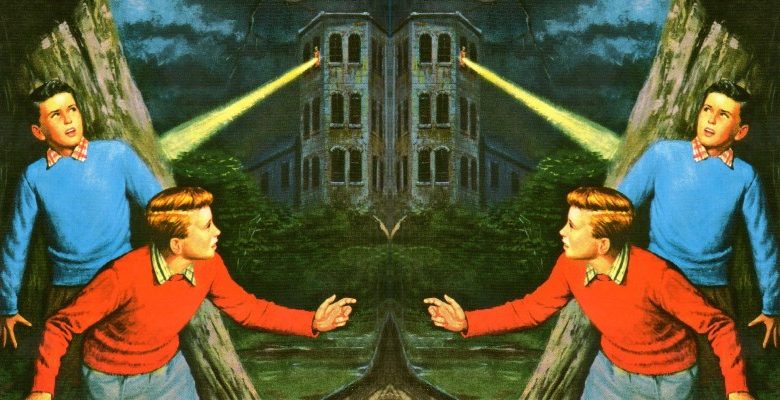[ad_1]
One of my favorite movies is the crime classic “Before and After.” Meryl Streep plays Carolyn Ryan, a doctor and mother married to a hot sculptor played by Liam Neeson. (Neeson even sports a scruffy moustache.) Life is idyllic for the couple and their teen son, Jacob, until the town Sheriff shows up at their front door, looking for Jacob and revealing that Jacob’s girlfriend has been brutally murdered. The parents are shocked and reeling; Jacob is not, as he should be, asleep in his bed. Hot sculptor dad decides in an instant that his son might be a murderer and refuses to allow the Sheriff inside. Mom Meryl stares, stunned, at her husband, who believes without pause that their son could be evil.
Meryl thinks she understands her son completely—how could she not? He is her flesh and blood! He is the baby she bore and held and taught to eat and walk and—unfortunately, as it turns out—drive a car! The same car, in fact, that the couple will shortly discover is covered in blood and hidden in the garage.
As a novelist, I seek these moments, when everything ordinary becomes strange. And there is nothing quite so terrifying (in the best way) as realizing that you do not—even cannot—truly comprehend those closest to you. Mom Meryl knows in her bones that her son must be innocent and in dire trouble, that he did not kill anyone. Hot sculptor dad believes anything is possible, and that his job is to hide the evidence and protect the son that could be guilty of anything, even murder.
Parenting is a wild ride. I was transformed from an independent woman to an overwhelmed mess, to someone who accepted never being alone, to being the mom of a baby who is over six feet tall and who is ready-and-how to head to college and leave his childhood bedroom (and—sob—his mom) in the rearview mirror. During my first son’s fifteenth summer, there were days and nights when I wasn’t sure where my eldest son was. Not in a “Oh, no, did he murder someone” way; just in a “My best friend and I bought a sailboat and your Life360 tracking app must not work when I’m in the middle of Lake Buchanan” kind of way. And as soon as he got his driver’s license, he cemented a life outside mine.
These hot summer months were both a crisis for me and the inspiration for my novel, The Lifeguards, a story of mothers and sons and secrets. At the same time as I processed the fact that my son’s life was no longer intertwined with mine—and subsequently that I was no longer in my teen years, at the very start of things, though I remembered my own fifteenth summer so well!—I was taking note of how the excruciating passage between “mom in charge and all knowing” to “old lady on the sidelines” could lead me to a new novel.
But how?
The answer is that the fuel for every narrative engine is a disconnect between what a character is sure is true and what might also (or even better: instead) be true. The answer is conjuring liars and those who believe them. The answer to how to write a novel is secrets.
I didn’t really understand this consciously until one conversation I had with the novelist Grant Ginder. “I mean, isn’t every novel about secrets?” he said.
“What?” I said.
“All of my novels are about the price of keeping a secret,” said Todd.
I was stunned. I have written nine novels and I would have told you they were about love, abandonment, belonging, or joy until that moment when I realized that, in fact, all of my novels were also about the price of keeping a secret.
So how do you use secrets? For The Lifeguards, I had already created a dead body, a cop, and some mothers and sons. I knew I was interested in teenager’s lives, and the time when they forge their own identities, and the trouble those who love them have with this transition. But why should a reader care? How could I create a functional and thrilling three-act structure for a story of mothers and sons?
First (as with all thriller/crime novels) I wrote the scene leading up to a dead body. As the author, I needed to understand exactly what had happened and who had been there. (I do sometimes go back and re-jigger crime scenes, especially if I realize a different action could create more tension for a character in the present-day storyline. For example, when I realized one mother was a control freak terrified of her son getting in an accident, I went back in time and left one of her son’s expensive knee guards at the crime scene, neatly labeled with his name and address by the control freak mother, ensuring that her perfectionist tendencies directly lead to her son to becoming a prime suspect in the case.)
Late in the game, I actually decided to add a past storyline that would reveal the night of the crime from each boys’ points of view. I took these scenes, based on my very first pages, and sprinkled them into the novel painstakingly, so the reader could slowly piece together what had happened as the cops and mothers and sons begin to understand. I also added the dead body’s point of view (while she was alive; I don’t do ghosts) to lend her death weight by creating her diary entries leading up to her fateful end and adding these into the book. (I also created newspaper articles about her life for the same reason…if a reader doesn’t care about the victim of a crime, the reader will lose interest in the crime investigation.)
In other words, my characters had secrets. Lots of them. I gave each teen a secret, then each mom a secret, some more nefarious than others. I even gave the sexy cop, Salvatore, a sexy secret that would compromise his work. I, alone, understood the ultimate secret of how all the rest of the secrets played out. Even the twist at the end is a bit of a secret.
Honestly, I’m a reader even more than a novelist. Sometimes, I just fall into a novel and stop trying to figure out how the author pulled it off, and these are usually because I love a character and the character has a secret and I (as a reader) know the secret but I revel in watching the character keep—and hopefully reveal—the secret that will ruin (and/or save) their lives.
We don’t know each other. This is the ultimate secret and the one we can’t accept, no matter how hard we try. As I get older, I begin to realize all the people I thought were wrong or mean just had (or still have) a different narrative going on. I might conclude a friend is selfish when actually they have a secret burden I know nothing about that kept them from coming to my birthday party. (Or coming but leaving early.) (Or not even responding to the damn E-vite even though I needed to order the right amount of barbecue and it was annoying not to know the head count.)
This is hardest to reckon with when it’s family, or chosen family. A parent who is a “bad parent” by pretty much any definition can also at the same time be a troubled adult with secrets. Nobody wants to hurt those they love. Holding a secret sucks. Keeping a secret might drive you to do anything, to murder. Maybe not you, but I think maybe, me. One person’s murder might be another person’s saving their life, or saving their child’s life.
I’m going to stop here before I give too many secrets away. I once took a craft class with the Pulitzer Prize winning, hilarious, genius Michael Cunningham. He asked us each to name a fictional character and list ten things about them. After hair color and job, after purse contents and where they live, by about number eight or nine, you’re spilling their secrets.
And that is how is all begins, and also (conveniently) how it ends, and also how it plays out over Act One, Midpoint, Climax Scene (aka Denouement) and The Big Reveal. My recipe for kickstarting a thrilling narrative is this:
Make coffee. Instant is fine.
Ask yourself: what secret are you keeping right at this very moment?
Pour coffee. Open notebook, laptop, eyes.
Write down your secret.
Write down who can never know this secret.
Write down what—be honest with yourself, truly—would you do to keep this secret?
Ask yourself: would you do anything?
Is your secret that you would do anything?
Is your secret what you’ve already done?
(Pro tip: Best case scenario is both.)
Pour more coffee. Keep typing. If needed, check into a motel room. Write until you run out of coffee or secrets and begin again when you have replenished both. Motel bar happy hour eavesdropping is recommended. I don’t drink anymore but I still eavesdrop in motel bars.
There is one of my secrets revealed: I am an upstanding mother of three who frequents skeevy motel bars in the name of “work excursions.” I even label my bar tabs work-related expenses come tax time. I can see how these “work excursions” could go terribly wrong. One night, one return to Scotch-drinking, one mistake.
One terrible secret and a character with everything (a beautiful family, a trusting husband, a mom who—like Meryl Streep in “Before and After”—would believe anything I told her) at stake.
And away we go.
***

[ad_2]






